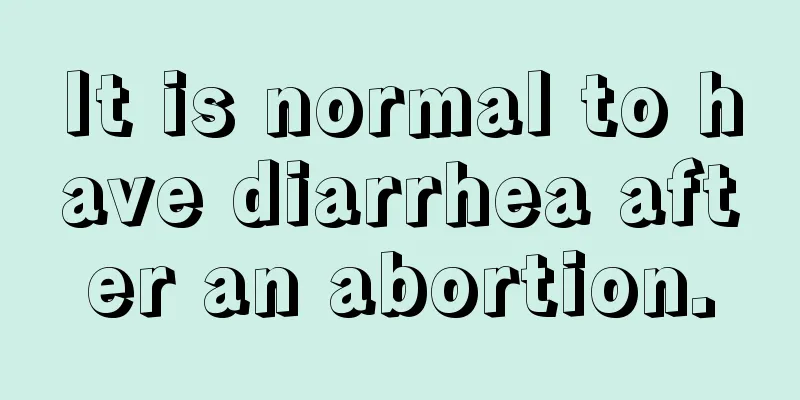Will my breasts swell and hurt when I'm two weeks pregnant?

|
A pregnant woman's belly will gradually grow larger and her body will undergo many changes, including morning sickness, body shape changes, stretch marks, and nipple swelling and pain. These are all physical reactions caused by pregnancy. Breast pain is mainly caused by the fact that the body secretes a lot of estrogen and progesterone after pregnancy, which promotes the growth of breast glands and stimulates breast pain. Will my breasts swell and hurt when I'm two weeks pregnant? 1. One or two weeks after conception, the breasts will become particularly soft. This is because early pregnancy stimulates the pregnant woman's body to produce a lot of estrogen and progesterone, causing the glands in the breasts to begin to grow. These hormones cause the breasts to retain more fluid. 2. In the early stages of pregnancy, in addition to breast enlargement, pregnant women may also experience symptoms such as frequent urination, mild vaginal bleeding, nausea, headache, dizziness, and emotional instability. What other reactions will occur in early pregnancy 1. Mild vaginal bleeding The fertilized egg will implant in the uterus within 6-12 days after conception, which may cause slight vaginal bleeding in pregnant women. If this happens, pregnant women do not need to worry if the vaginal bleeding is mild and there are no serious discomfort symptoms. This is a normal physiological reaction when the fertilized egg implants and is harmless to the human body. Implantation bleeding of the fertilized egg manifests as a small amount of blood or blood spots, which can be seen several times a day. The bleeding lasts for about three days, and there is no discomfort during menstruation. Implantation bleeding of the fertilized egg needs to be distinguished from menstruation to prevent pregnant women from being pregnant without knowing it. 2. Frequent urination You may think that frequent urination is a symptom that won’t come so early, and that it will only appear when the fetus is able to squeeze the bladder, but in fact, this symptom may appear in the early stages of pregnancy. Frequent urination in early pregnancy is mainly caused by changes in hormonal secretions in the body. Not only does the expanded uterus put pressure on the bladder, but the increased blood flow also puts pressure on the kidneys, leading to increased urine. 3. Loss of appetite, nausea and vomiting These signs may appear as early as two weeks after conception. Because the secretion of flavonoids will reduce the functions of many body systems and affect the digestive system, it may sometimes cause constipation and indigestion. Nausea and vomiting are related to human chorionic gonadotropin in the body. The higher the level of this hormone, the easier it is to feel nauseous. Breast pain is a normal phenomenon after pregnancy, so mothers don’t need to worry. They should pay enough attention to some problems, such as bleeding during pregnancy, but there is no need to make a fuss about some other problems and normal physiological reactions. This is not only not good for pregnant women, but also harmful to their children. You still need to be calm when necessary! |
<<: Does chemotherapy affect menstruation?
>>: Can pregnant women eat roast duck?
Recommend
Causes of thyroid nodules in women
There are still many women who have thyroid nodul...
Can “diabetic babies” take lactulose oral solution?
If you have a "diabetic baby" (a baby w...
Can cervical erosion cause lower back pain?
Cervical erosion is a common gynecological diseas...
"Sun Wukong" of the cell world, how to release it from under the "Five Elements Mountain"?
Produced by: Science Popularization China Author:...
What is the cause of bleeding during pregnancy?
Bleeding in early pregnancy is common in threaten...
Reasons for bleeding in women
There are many common diseases among women. When ...
What is the cause of amenorrhea due to thin endometrium?
I believe that for female friends, the menstrual ...
Can you get pregnant during the safe period?
Many women use the safe period as a method of con...
Symptoms of first menstruation in girls
Generally, girls have their first menstruation at...
What is the cause of yellow vaginal discharge in girls?
Our leucorrhea is like a barometer, and any unhea...
How to check for habitual miscarriage? Three common inspection items
If patients with habitual miscarriage want to hav...
What is the reason for the delay of menstruation for half a month?
The female menstrual cycle is generally about 28 ...
Can cupping be used in early pregnancy?
Pregnant women still need to take conditioning me...
How to treat Yin deficiency and internal heat in girls?
Most of the symptoms of yin deficiency and intern...









